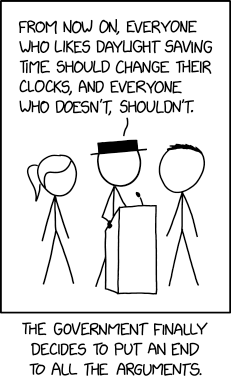The first (from XKCD's Randall Munroe) has some obvious issues.
Monroe also suggests an alternate solution in the title text, averaging out the spring and fall changes and setting clocks 39 minutes ahead year-round.
While Monroe's 39 minute approach is more practical, it still doesn't address the primary advantages and drawbacks of the current system. Most people like getting an extra hour of weekend and dislike losing an hour. Historically, this has been presented as an unavoidable trade-off, but it doesn't have to be if we just broaden our thinking. If we just set our clocks back twice a month, by the end of the year, everything will work out even.
The good people at Explain XKCD point out an unexpected benefit of the current system: in at least two separate cases, terrorists have blown themselves up due to failure to spring forward or fall back.

Daylight savings time articles always make me feel guilty. The Japanese have always refused to do DST. Largely because the rural constituency is opposed and overrepresented electorally (rural depopulation is happening way faster than reapportionment). And I used to rank on them for perversely refusing to do the obviously right thing (which turns out to be a bad idea). Oops.
ReplyDeleteThe Japanese love to dig their heels in and refuse to change (lefties opposing the Narita airport, the governement funding whaling and calling it "research", currently refusing to admit that the 2025 Osaka Expo has failed), but (sounds of grinding teeth) twice every 24 years, they get something right.
But, to avoid being accused of getting something right, Tokyo's in the same time zone as China, and clocks need to be shifted by two hours so we can have summer evenings and not be woken at 5:00 am much of the year. And that's not going to happen. Sigh.